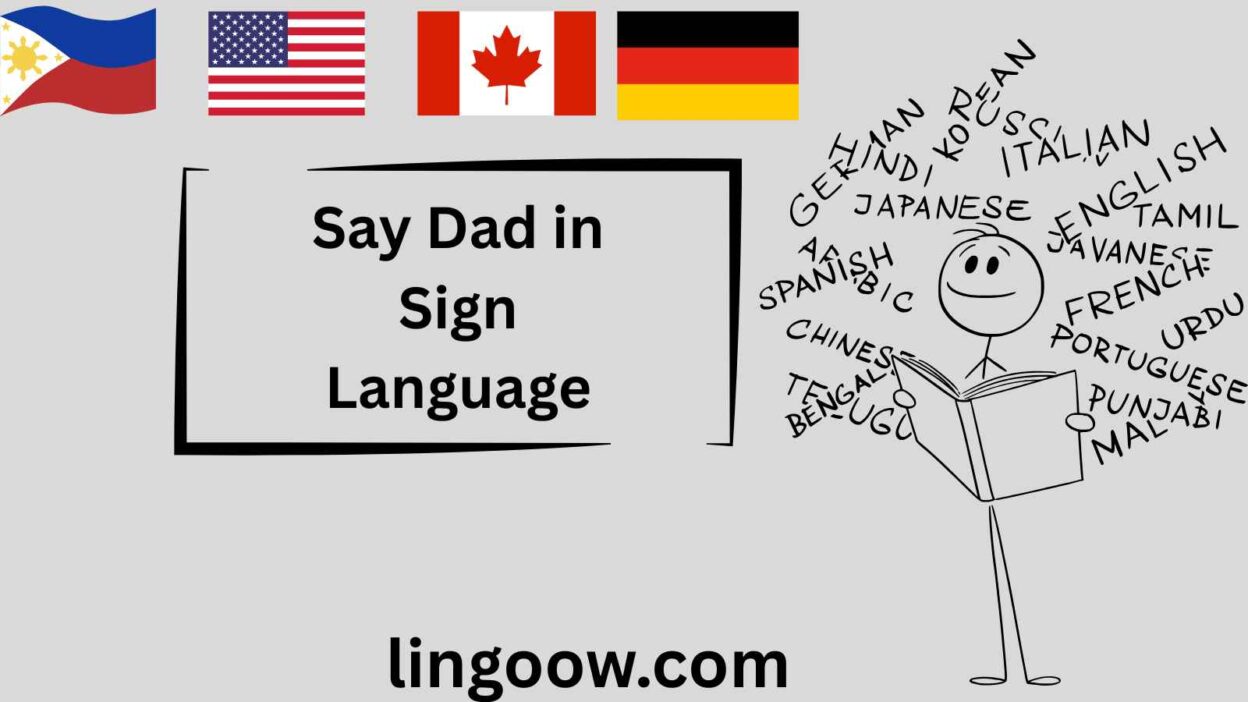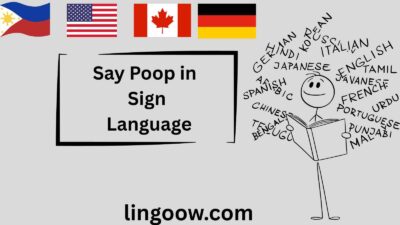I still remember the first time my toddler signed dada.
No sound, just two tiny hands opening and closing at his chest while his eyes locked on his father walking through the door.
In that silent heartbeat, a word was born. Across every culture I’ve ever met, that same moment happens—only the shape of the hand, the lift of the voice, or the tilt of the head changes.
“Dad” is the first bridge we build between generations, and it is spoken, signed, and felt in thousands of ways.
Today we’ll learn the simple American Sign Language (ASL) sign for dad, then travel the planet to hear how fathers are named in more than 80 languages and 60 countries.
By the end, you’ll carry a pocketful of new words—and maybe a deeper ache of gratitude for the man who answers to yours.
Quick ASL Tutorial
- Make a loose “5” hand (fingers spread, thumb touching the forehead).
- Tap the thumb twice near your forehead.
- Smile—because every dad knows that sign is coming with a hug.
(British Sign Language uses the same handshape but taps the chin; more on regional signs later.)
Global Fatherhood Cheat Sheet
(15 starter languages – scroll down for 65+ more in the deep dives)
| Language | Word for Dad | Cultural Note |
| English (US/UK) | Dad / Daddy | Informal; “Father” is formal or religious |
| Spanish (Spain) | Papá | Double p mimics baby babble |
| French (France) | Papa | Used by children and adults alike |
| Italian (Italy) | Papà | Stress on final syllable = affection |
| German (Germany) | Papa / Vati | Vati is cozy northern dialect |
| Mandarin (China) | Bàba (爸爸) | Reduplication = toddler speech |
| Hindi (India) | Papā / Pitāji | Pitāji adds respect suffix -ji |
| Japanese (Japan) | Otōsan (お父さん) | Polite; Papa borrowed from Europe |
| Korean (South Korea) | Appa (아빠) | Casual; Abeoji for elders |
| Arabic (Egypt) | Bābā (بابا) | Universal across dialects |
| Swahili (Kenya/Tanzania) | Baba | Also means “grandfather” in some villages |
| Zulu (South Africa) | Baba | Same spelling, deeper vocal tone |
| Yoruba (Nigeria) | Bàbá | High-tone reverence |
| Māori (New Zealand) | Pāpā | Adopted from English but fully Māori now |
| Hawaiian | Makua kāne | Makua = parent, kāne = male |
European Languages
France – Papa
In Parisian cafés you’ll hear a three-year-old yell “Papa!” exactly like a New Yorker yells “Dad!” The French Academy tried to enforce père in the 1700s; babies ignored them.
Spain – Papá
Andalusian children stretch it to papiiii when they spot dad’s motorcycle. In Basque Country, though, he’s aitá—short, ancient, and unrelated to Indo-European roots.
Italy – Papà
Neapolitan grandfathers answer to papà at 90. The word refuses to retire.
Germany – Papa & Vati
East Germans kept Vati through the Cold War; West Germans leaned Papa. Reunification let both live side by side.
Bonus Mini-Table (10 more European tongues)
| Language | Word | Country Note |
| Portuguese | Pai | Brazil: painho (diminutive) |
| Dutch | Papa / Vader | Vader = Darth energy |
| Swedish | Pappa | Double p again—universal baby talk |
| Polish | Tato | Warm, northern Slavic |
| Greek | Bámpas (Μπαμπάς) | Athens street slang |
| Russian | Pápa (Пáпа) | Informal; Otéts formal |
| Irish Gaelic | Daidí | Pronounced “Dadgee” |
| Welsh | Tad | One syllable, mountain strong |
| Finnish | Isi | Not Indo-European—unique root |
| Icelandic | Pabbi | Viking babies babbled too |
Asian Languages
Mandarin bàba is soft; Cantonese bàh-bā drops like a drumbeat. In Hindi, papā is playful, but pitājī bows the head. Japanese otōsan keeps polite distance until bedtime, when papa slips out.
Spotlight Table (Asia)
| Language | Word | Country |
| Mandarin | Bàba | China |
| Cantonese | Bàh-bā | Hong Kong |
| Hindi | Papā | India |
| Urdu | Abbu | Pakistan |
| Bengali | Baba | Bangladesh |
| Punjabi | Pāppā | India/Pakistan |
| Tamil | Appā | India/Sri Lanka |
| Telugu | Nānna | India |
| Malayalam | Appan | India |
| Japanese | Otōsan | Japan |
| Korean | Appa | South Korea |
| Vietnamese | Ba | Vietnam |
| Thai | Ph̀x (พ่อ) | Thailand |
| Indonesian | Ayah | Indonesia |
| Malay | Bapa | Malaysia |
| Tagalog | Tatay | Philippines |
| Khmer | Ovpuk | Cambodia |
| Lao | Phȍ | Laos |
| Turkish | Baba | Turkey |
| Persian | Pedar | Iran |
| Arabic | Ab (أب) | UAE, formal |
African Languages
Swahili baba stretches from Kenyan coral beaches to Tanzanian spice markets. In Yoruba compounds, bàbá with a high tone means “father”; low tone means “mister”—context is everything.
Spotlight Table (Africa)
| Language | Word | Country |
| Swahili | Baba | Kenya, Tanzania |
| Zulu | Baba | South Africa |
| Xhosa | Tata | South Africa |
| Yoruba | Bàbá | Nigeria |
| Igbo | Nna | Nigeria |
| Hausa | Baba | Nigeria, Niger |
| Amharic | Abbat | Ethiopia |
| Tigrinya | Abbo | Eritrea |
| Somali | Aabo | Somalia |
| Afrikaans | Pa | South Africa |
| Shona | Baba | Zimbabwe |
| Chewa | Bambo | Malawi |
| Kikuyu | Baba | Kenya |
| Luo | Baba | Kenya |
| Wolof | Papa | Senegal |
| Fulani | Baaba | Guinea |
| Berber | Baba | Morocco |
| Oromo | Abbaa | Ethiopia |
| Twi | AgYa | Ghana |
| Lingala | Tata | DRC |
Indigenous & Island Languages
Māori pāpā arrived with English sailors but now rings in haka. In Cherokee, e-do-da is three syllables of mountain love. Hawaiian makua kāne reminds every child: you are half your father, half the sea.
Spotlight Table (Indigenous & Islands)
| Language | Word | Region |
| Māori | Pāpā | New Zealand |
| Hawaiian | Makua kāne | Hawai‘i |
| Cherokee | Edo’da | USA |
| Navajo | Shizhé’é | USA |
| Inuktitut | Ataata | Canada (Arctic) |
| Quechua | Tayta | Peru |
| Aymara | Taita | Bolivia |
| Guarani | Túva | Paraguay |
| Samoan | Tamā | Samoa |
| Tongan | Tamai | Tonga |
| Fijian | Tama | Fiji |
| Tahitian | Metua tāne | French Polynesia |
| Yupik | Aapa | Alaska |
| Mapudungun | Chaw | Chile |
| Cree | Nōhkom | Canada |
| Aboriginal (Yolngu) | Wäwa | Australia |
| Warlpiri | Pipa | Australia |
| Inuit (Greenland) | Ataata | Greenland |
| Malagasy | Ray | Madagascar |
| Chamorro | Tåta | Guam |
Cultural Insights
The Proto-Indo-European root ph₂tḗr (circa 4500 BCE) echoes in English father, Latin pater, Sanskrit pitṛ. Meanwhile, Niger-Congo ba spread across a continent without chariots or writing.
Linguists call this “nursery convergence”: babies worldwide land on /ba/, /pa/, /da/ because they’re the easiest sounds to make while breastfeeding. Culture then polishes the gem.
In Confucian China, fù (父) is a radical in characters for “teacher” and “king.” In the Yoruba Òrìṣà tradition, every man is bàbá to someone—biological or chosen. The Maasai warrior who spears a lion becomes baba the day his daughter signs it in dust.
Proverbs About Fathers – Wisdom in Every Tongue
- Spanish: De tal palo, tal astilla. (“From such stick, such splinter.”)
- Japanese: Tiger dies and leaves its skin; man dies and leaves his name.
- Yoruba: Ọmọ tí a kò kọ́ ni yóò gbé ilé tí a kọ́ run. (“The child you don’t teach will destroy the house you built.”)
- Swahili: Asiyefunzwa na mamae hufunzwa na ulimwengu. (“He who is not taught by his mother will be taught by the world.”)
- Hawaiian: ‘Ike i ke au nui me ke au iki. (“See both the big current and the small.” – Dad’s job.)
FAQs
Q: Why do so many languages use “papa” or “baba”?
A: Infant mouths. Bilabial sounds (/p/, /b/, /m/) require only lips—no tongue gymnastics. Add emotional warmth, and the word sticks for life.
Q: What’s the oldest written “father”?
A: Sumerian cuneiform ad-da on a 4,500-year-old clay tablet from Ur—roughly “daddy.”
Q: Are there cultures where “mother” and “father” flip?
A: In some matrilineal Minangkabau villages (Indonesia), children call their uncle bapak and biological father by first name—lineage runs through mom.
Q: Do sign languages share a universal “dad”?
A: No—ASL taps forehead, BSL taps chin, Japanese Sign Language uses a two-handed “honor” gesture. But every deaf child’s eyes light the same.
Conclusion
Whether you tap your forehead in ASL, bow with otōsan in Tokyo, or whisper bàbá under a baobab tree, the message is identical: I see you. I need you. I love you

Hi, I’m Elara Quinn, a professional author with a passion for language, culture, and communication. Through my work at Lingoow.com, I aim to make learning languages simple, fun, and meaningful for readers of all ages. With years of experience in writing and linguistics, I craft content that not only educates but also inspires curiosity and creativity in language learning. At Lingoow.com, I share tips, guides, and insights that help users connect with the beauty of languages around the world. Join me on this journey of words, stories, and discovery!




